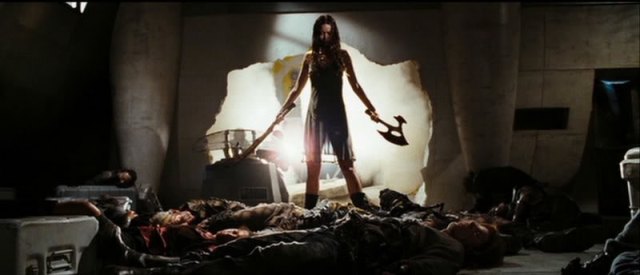 A writer friend posted this picture on Facebook this morning and invited my comment. You really don’t do that unless you mean it. I don’t like to get political and I don’t really like the term “feminism.” I’ve always joked that women who seek to be equal to men are underachievers.
A writer friend posted this picture on Facebook this morning and invited my comment. You really don’t do that unless you mean it. I don’t like to get political and I don’t really like the term “feminism.” I’ve always joked that women who seek to be equal to men are underachievers.
The fact of the matter is that I strongly believe that each gender has its strengths and both male and female should support and encourage each other. The traditionally “male” role complements the traditionally “female” role and one is neither superior nor inferior to the other. I also believe that I can accomplish whatever I set my mind to and my gender has less to do with it than my determination and skill.
I believe that the term “feminism” is insulting to me. It implies that women cannot gain true equality to men without the help of enlightened men making adjustments and setting the bar lower so we poor, weak creatures can reach it. That’s not equality. It’s condescension.
Growing up in a home with three brothers and eight male cousins, there was very little doll-playing going on. When playing with my brothers, I crawled on my belly taking the beaches of Normandy with my stick rifle across my forearms along with everyone else. The taunt of “You can’t because you’re a girl” always resulted in “Watch me!” followed by my doing just what their friends said I couldn’t.
Of course my accomplishments were declared a fluke and I was shoved aside and told to go play with dolls while they went off to do “important” boy things.
My mother once told me that boys didn’t like when girls beat them, so I needed to let the boys win.
Screw that!
 Why should I hide who I am or pretend to be less than I am to make someone else feel better about themselves? By the same token, why should I expect someone else to lower the bar so I can reach it. If I want it badly enough, ‘no power in the ‘verse can stop me’ regardless of how high it sits.
Why should I hide who I am or pretend to be less than I am to make someone else feel better about themselves? By the same token, why should I expect someone else to lower the bar so I can reach it. If I want it badly enough, ‘no power in the ‘verse can stop me’ regardless of how high it sits.
I’ve been called a “femi-nazi” an “Amazon” and several obscenities that my brothers would have decked them for using. I knew going in what I was in-for by working in a male-dominated industry. Some men are intimidated by women and feel the need to denigrate them just to make themselves feel better.
 I’ve got news for you, some women are intimidated by strong women who don’t fit into the typical cheerleader mold and feel the need to denigrate them just to make themselves feel better, too.
I’ve got news for you, some women are intimidated by strong women who don’t fit into the typical cheerleader mold and feel the need to denigrate them just to make themselves feel better, too.
I don’t feel that’s an issue that falls under feminism. That’s an issue that falls under some-people-who-have-a-sense-of-power-over-others-fear-those-who-will-not-fall-in-line-with-their-world-view. That’s not being a feminist. That’s being a free-thinking, intelligent human being. If there is an obstacle in the way of my goals, I will overcome it on my own, thanks. I don’t need a group of condescending men and women in power legislating it away for me.
Whether we like it or not, prejudice against women writers is alive and well. I see it with SF more so than with Fantasy, mostly because I’m most active in that genre. The stereotype of the SF fan being primarily male, between the ages of 13 and 30, socially awkward, living in his parents’ basement is still strong, but oh-so-outdated.
Recent scandals of sexual bias and harassment have rocked the SFWA. Women in the genre are marginalized and often vilified. Unless one is writing SF Erotica or SFR, having a feminine name on the cover does reduce sales.
When it first came out in my town that I’m a novelist, the local editor/owner for the free newspaper asked if I wrote about “trips to the grocery store.”
 Rather than start beating my chest and crying over the unfairness of it, I considered the source. He’s a condescending blowhard with few friends in town who is still angry over the fact that I beat him like a red-headed step child the one and only time he challenged me to a game of “Upwords.” I tried to warn him that I play cutthroat Scrabble and tend to make my opponents cry, but he just had to challenge me.
Rather than start beating my chest and crying over the unfairness of it, I considered the source. He’s a condescending blowhard with few friends in town who is still angry over the fact that I beat him like a red-headed step child the one and only time he challenged me to a game of “Upwords.” I tried to warn him that I play cutthroat Scrabble and tend to make my opponents cry, but he just had to challenge me.
In case you’re wondering, I looked at him in disgust, told him to stop being an ass and said I was writing a SF series filled with political intrigue following a military officer wanted for treason while she tries to find her kidnapped father, clear her name, and prevent an assassination plot that will plunge the galaxy into civil war. I doubted she had much time for grocery shopping.
Women and girls are less likely to care about the gender of the author. Men and boys have preconceived ideas of what women write. It may not be right, but the fact remains that it *IS*.
We can stubbornly stick our given names on the covers of our books and whine about pathetic sales and wonder why men don’t buy them. We can also suffer the ridicule of males threatened by intelligent women while we’re tilting windmills over it.
 Men in power are like wookiees, they don’t like to lose and tend to get upset and pull people’s arms out of their sockets. Let’s face it, it’s not about prejudice as much as it is about a group of people in power over an industry who are loathe to relinquish said power.
Men in power are like wookiees, they don’t like to lose and tend to get upset and pull people’s arms out of their sockets. Let’s face it, it’s not about prejudice as much as it is about a group of people in power over an industry who are loathe to relinquish said power.
For now, that is the nature of the industry. Ideas do not change overnight. In the decades that I’ve been writing, I’ve seen many, many changes within society and within the industry. When I first began, the strong, kick butt heroine was anathema and completely unheard of. She was the kiss of death for a manuscript.
 Thanks to Xena, Buffy, and Charmed, or rather Sam Raimi, Joss Whedon, and Aaron Spelling, the female action hero is no longer a thing of the past, although I doubt without the male of the species putting his weight behind the notion, women writing and producing these characters would ever have gotten past the elevator pitch. Right or wrong, it’s the nature of the industry.
Thanks to Xena, Buffy, and Charmed, or rather Sam Raimi, Joss Whedon, and Aaron Spelling, the female action hero is no longer a thing of the past, although I doubt without the male of the species putting his weight behind the notion, women writing and producing these characters would ever have gotten past the elevator pitch. Right or wrong, it’s the nature of the industry.
Feminist? Perhaps. Capitalistic? Certainly. I’d be willing to bet that these men who produced these cutting edge women saw the potential fan-base for strong female characters in the rising numbers of young men of the 90’s having grown up in single parent households and tended to view their mother as provider and protector.
I’m jaded enough to attribute their choices to dollar signs rather than any sense of social justice or feminist responsibility.
The gatekeepers of the industry can’t argue with sales. While the traditional SF/F publishers are less inclined to give shelf space to women writing in the genre, it *is* a business and sales are the bottom line. When the sales of female authors match or outstrip the male of the species, you’ll see change. To first get those sales at this point in time, one must play the game.
For the time being, women using initials or a male pseudonym in order to be taken seriously in a male-dominated genre is simply the way things are done. In time, with networking, the rise of self and indie publishers more inclined to take a chance on women writers, that will change.
Our daughters and granddaughters will thank our initialed nom de plumes for paving the way for them to use their own names on their own SF/F covers.

I had a good giggle at ‘underachievers’. Oh dear. But yes, I totally agree – equals, with different strengths and weaknesses. Great post.
Thanks, Laurel. I’m pretty sure we’ve had similar conversations before. 😉
I used initials just because I thought it sounded cooler than my real name. That said, I’ve never decided to buy or not buy a book because of the author’s name or gender.
That’s because you’re not a neanderthal, nor are you put off by strong women.
Personally, I like strong women. Right dear?
LOL! It takes a strong man to appreciate a strong woman. You’re not a neanderthal either, dear.
Hmm. Biblically speaking, I’m right there with you on the complementary skills and encouragement from both directions. I am teaching 5th and 6th graders this Sunday – what are we studying? Judges 4. Flip Wilson would be saying, “Here come da judge!” when Deborah gave Barak that “Geraldine” look after he said, “If you will go with me, then I will go; but if you will not go with me, I will not go.” as if Deborah was a stay-at-home prophetess.
Deborah was a judge appointed by the Lord and whether Barak thought it was his idea or not, she was going out. Oh, and don’t forget it was Jael that nailed Sisera to the floor with a tent peg. Frankly, I’m more worried about the violence of the story than the fact it features two strong women in the, er, driver’s seat.
And just to make sure I haven’t fallen completely off the train of thought, authors named Daphne du Maurier, Helen McInnes and Agatha Christie didn’t cause me a second of pause when I picked up their books in junior high. They were every bit as good as Dick Francis, Alistair MacLean, and the other male authors I read at the time.
Of course, I think Ayn Rand is a long-winded, self-aggrandizing, Maslow wanna-be. Smart? Yes. Woman? Yes. Didn’t stop me reading The Fountainhead and Atlas Shrugged. If a man had written them, then he would have been in for the same treatment.
I’m disappointed in my fellow men sometimes. Don’t let their short-sighted misogyny hold you back!
Pingback: Space for Rent: Women as Victims and Villains | Neither Here nor There....